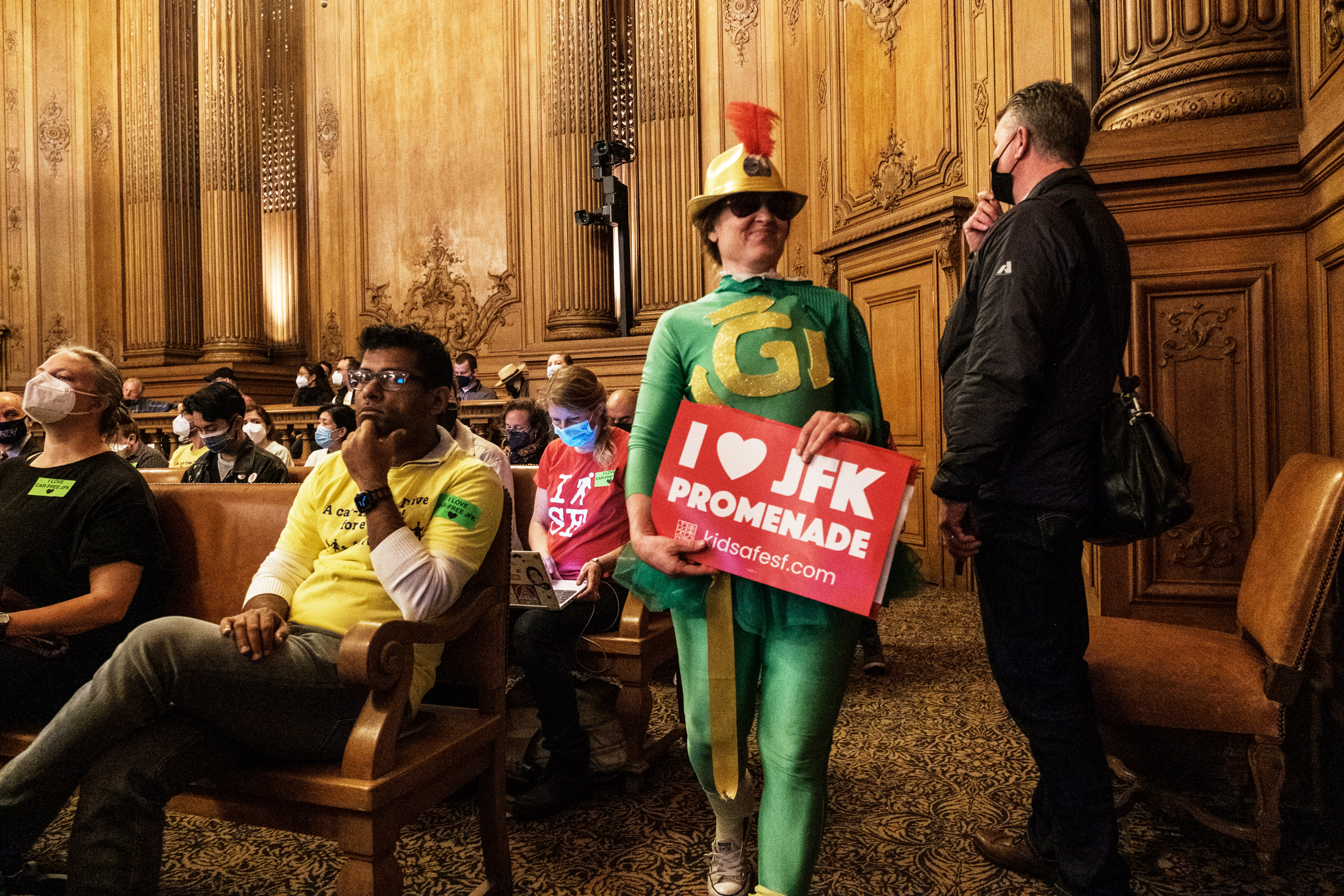Two nonprofits working to keep JFK Drive and the Great Highway car-free appeared to skirt IRS and election rules this summer when they solicited tax-deductible donations to fund a campaign fight that has consumed City Hall for more than a year.
The San Francisco Bicycle Coalition and Walk San Francisco, which receive city funding and advocate for safer streets for cyclists and pedestrians, respectively, sent emails in July encouraging their members to make tax-free donations for the election battle on whether cars should return to the coveted roadways.
While 501c3 nonprofits can advocate on political issues and ballot measures, the money used to fund these campaigns has to be properly reported, and this money cannot be used for tax write-offs.
The proponents of Proposition I, which seeks to return vehicle access to the Great Highway in the Sunset and JFK Drive in Golden Gate Park, claimed in complaints filed with the state’s Fair Political Practices Commission (FPPC) and the San Francisco Ethics Commission that the nonprofits violated these laws. Both the Bicycle Coalition and Walk SF support Prop. J, which would codify an ordinance passed by the Board of Supervisors to keep the roadways car-free, a move that occurred early in the pandemic.
While many parents, cyclists and pedestrians have celebrated the road closures, seniors and people with disabilities have joined forces with the de Young Museum, which JFK Drive runs by, to argue that the lack of access has created traffic congestion around the park and made public spaces harder to reach. The de Young blames JFK Drive’s closure on its multimillion dollar losses.
Jim Sutton, an attorney working on the Prop. I campaign, told The Standard in a phone interview that the violations were “clear from the face of the letter” each organization sent out to members.
“There is no real defense. It’s kind of just what it is,” Sutton said. “I don’t know if they were intentionally flaunting campaign and tax laws, but the Bike Coalition doesn’t get to claim they’re a little nonprofit.”
A letter from the FPPC confirmed the complaint is being reviewed, while the Ethics Commission has not issued any findings on the allegations and is unlikely to do so until after the election.
Janelle Wong, executive director of the SF Bicycle Coalition, which has roughly 8,000 members and is expected to receive nearly $564,000 in city grants and payments for 2022-23, said in a phone interview Wednesday that roughly $5,400 was raised from the erroneous fundraising emails sent in July. All of that money, she added, was returned after the organization became aware of the issues raised in Sutton’s Sept. 20 letter to her board.
“We didn’t commit tax fraud, and certainly we’re not trying to mislead anybody about our work,” Wong said. “We did reach out to members who donated money to that email and refunded all donations in an abundance of caution.”
Jodie Medeiros, executive director of Walk SF, said she reached out to Sutton last month to see if he could help her group with campaign compliance, only to learn that his firm was already working on Prop. I.
A short time later, she said, Sutton sent a letter accusing her group, which has fewer than 2,000 members and an annual budget of less than $1 million, of breaking the law.
Medeiros acknowledged that Walk SF crossed a line in its campaigning and reporting, but the organization has since returned about $5,000 garnered from the fundraising emails and filed the proper disclosures. Walk SF, which is expected to receive nearly $265,000 in city grants and payments for 2022-23, also created a multipurpose organization to handle its campaign work in the future.
“It’s not surprising that they raise this now, in a fight in which they feel they need to do more to distract us from our core work,” Medeiros said. “We’re doing our best to continue advocating for safer streets in San Francisco.”
Money has played a huge role in the fight over JFK Drive and the Great Highway, as the Corporation of Fine Arts Museums (COFAM)—a nonprofit linked to the de Young Museum—and a parents group called Kid Safe SF have combined to spend more than $292,000 on lobbying and influencing efforts going back to last year. A key difference is that the parents’ group has mostly held community events while COFAM has funded meetings to bend the ears of city officials.
Meanwhile, Dede Wilsey, a longtime benefactor of the de Young, threw in $200,000 of her own money in June to help gather signatures to get Prop. I on the ballot.
Prop. I backers spent more than $650,000 by the end of September, and COFAM tossed in $75,000 to support the measure last week. Meanwhile, Prop. J’s campaign spent just $265 as of last month while the Grow SF PAC spent $9,300 to support the measure while also opposing Prop. I. The Prop. J backers should soon come out of hibernation, though, as Yelp CEO Jeremy Stoppelman recently gave $300,000 to support the car-free position.
If both ballot measures pass but one gets more votes, that one will become the law of the land. New polling by The Standard shows that voters are more inclined to keep the roads car-free, but the issue is far from decided.
Additional costs could come into play if Prop. I successfully overturns the will of the Board of Supervisors. A cost analysis by the San Francisco Controller’s Office found that reopening the Great Highway to car traffic would trigger a 20-year, $80 million infrastructure project, as coastal erosion is deteriorating the roadway.
Wong said the ongoing cost to taxpayers, on top of the benefits of car-free streets, should not be lost on voters.
“In our mind, JFK Promenade is sort of the crown jewel of what’s come out of the pandemic,” she said, adding that the Great Highway’s reopening would be particularly onerous. “I don’t want my taxpayer dollars to go toward keeping a road open to cars while it is currently falling into the ocean.”

